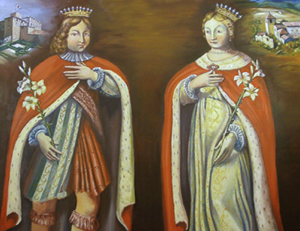 |
Church - State Relations
Laws that Generate True Peace
Hugh O’Reilly
In the year 1295 Elzear, Count of Sabran, Count of Ariano and Lord of various baronies in Provence, was born in the Castle of Saint-Jean-de Robians in southern France. After his death in 1323, the process for his canonization was started. The miracles worked through his intercession were confirmed by Pope Clement VI, and he was canonized by Pope Urban V.

St. Elzear de Sabran and his wife Blessed Delphine ruled over lands in Provence and Naples |
Elzear was educated by his uncle, Abbot William of Sabran of the Abbey of St. Victor at Marseille. He married the virtuous Delphina of the House of Glandèves. To govern his lands, he dictated this set of laws, which we reproduce here for the benefit of parents and those who govern:
1.None of my subjects is allowed to blaspheme in my domains. For, just as the honor we give to God attracts His favor and graces, so also perjuries and blasphemies - which express more the language of Hell than that of men - attract the chastisement of Heaven, damning our bodies and souls.
2.I desire that devotion to the Holy Mother of God be introduced in all my lands. Consequently, I desire that all my subjects take her as Patroness. For, when we have need of the mercy of God, there is nothing better we can do than to have recourse to this all-powerful Queen, so that she deign to receive us under her protection and be the Refuge of us, all sinners.
I forbid that any servile work be done on feast days consecrated to her cult. On those days I desire that all my subjects attend Mass and the Divine Office, under the penalty of punishments meted out by my officials.
3.I order my officials to exercise vigilance so that people live chastely in my lands and to expel the libertines. For since nothing filthy will enter into Paradise, nothing impure should be tolerated among Christians who are destined for eternal salvation.
4.I desire that all the great feasts of the Church, such as Easter, Pentecost, All Saints Day and Christmas, be properly and solemnly celebrated among us. Everyone should confess their sins on those occasions, or at the least, confess on two of these feasts each year. This applies as well to the feasts of the Assumption of the Virgin Our Mother and the Annunciation, so that she will always favor us in this world and, at the hour of our death, be our Advocate and obtain for us graces from her Son.

Ansouis, the Count's main castle |
5.I prohibit access to my household to all lazy men who do not want to work to provide for their living. The distribution of wheat that I make every year for the poor shall not be a pretext for laziness. In order to not encourage them to not work and wait for this alms, I expressly forbid my officials to give wheat to those who abuse this generosity. Thus, in order not to propitiate the loss of their souls through sloth, I order that they be left in their misery.
6.I forbid any games of chance, gatherings that offend God with execrable oaths as well as those that are occasions for personal fights. I do not forbid, however, diversions on feast days for the recreation of our bodies from their fatigue. But these diversions should not entail gain or loss of temporal goods, for this kind of loss generates nothing but enmities among my subjects.
7.I desire that all should live in peace. To conserve such a beautiful virtue, quarrels, personal fights and offenses – more fitting to devils than to men – must be avoided.
8.If a personal fight occurs, I desire that the two parties be reconciled before the sun sets. This is the application of the counsel of the Gospel, which advises us not to go to bed in enmity, for fear that the common Enemy of us all – who is always watchful – might stir up our uncontrolled passions during the night.
9.I command expressly that on every feast day, or on others when a sermon is preached, that all those living on my lands come to Church to hear the Word of God, the true nourishment for their souls. If irreligious or lazy persons should neglect to hear these sermons, they will be sent to prison and punished for neglecting the health of their souls.
10.None of my subjects should harm his neighbor, neither his goods nor his honor. They should honor one another as Christians who received the sign of Jesus Christ in Baptism, and are all destined to enjoy eternal happiness.

Based upon and translated from
Rohrbacher, Vida dos Santos, vol. 5, p. 243
Posted July 17, 2010

Related Topics of Interest
 St. Elzear de Sabran St. Elzear de Sabran
 Authentic and Artificial Leadership Authentic and Artificial Leadership
 The Debasement of Knighthood The Debasement of Knighthood
 St. Ignatius of Loyola and Knighthood St. Ignatius of Loyola and Knighthood
 What is Organic Society? What is Organic Society?
 The State Must Be Subordinate to the Church The State Must Be Subordinate to the Church
 Vocations of the European Peoples Vocations of the European Peoples

Related Works of Interest
|
|
Church-State | Cultural | Home | Books | CDs | Search | Contact Us | Donate

© 2002- Tradition in Action, Inc. All Rights Reserved
|
 |

|